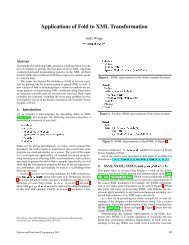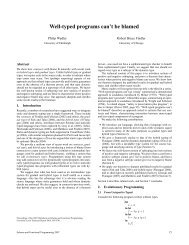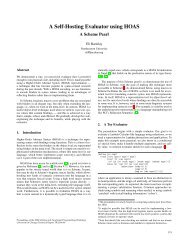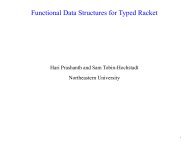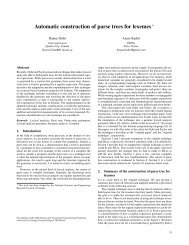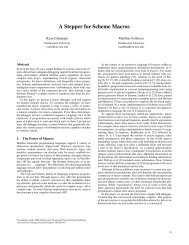2006 Scheme and Functional Programming Papers, University of
2006 Scheme and Functional Programming Papers, University of
2006 Scheme and Functional Programming Papers, University of
You also want an ePaper? Increase the reach of your titles
YUMPU automatically turns print PDFs into web optimized ePapers that Google loves.
Considering all <strong>of</strong> these issues together, we have arrived at the following<br />
final policy for clients resolving a PLaneT require statement<br />
for a particular program <strong>and</strong> a particular package.<br />
1. PLaneT first decides what package to use to satisfy the request:<br />
(a) If the program has a link in the linkage table to a particular<br />
version <strong>of</strong> the package being requested, then PLaneT always<br />
uses that package.<br />
(b) If the program does not have a link, then PLaneT obtains a<br />
package that satisfies the request either from its local cache<br />
or from the central PLaneT server.<br />
2. If PLaneT decides on a version <strong>of</strong> a package, <strong>and</strong> another version<br />
<strong>of</strong> that same package is already loaded (not just installed<br />
but actually running) in some other part <strong>of</strong> the program, then<br />
PLaneT signals an error unless the package itself explicitly tells<br />
PLaneT that simultaneous loading should be allowed. Otherwise<br />
it uses the package it has decided on to satisfy the request.<br />
8. Evaluation<br />
Up to this point we have described PLaneT as we originally designed<br />
it. PLaneT has been in active use for over two years, <strong>and</strong><br />
in that time we have gained a lot <strong>of</strong> experience with how well our<br />
design decisions have worked out in practice. Generally we have<br />
found that our design works well, though we have identified a few<br />
problems <strong>and</strong> oversights, both with its technical design <strong>and</strong> with its<br />
ease-<strong>of</strong>-use features (which we consider to be at least as important).<br />
First the good: PLaneT has quickly become many developers’<br />
default way to distribute PLT <strong>Scheme</strong> libraries, <strong>and</strong> over the course<br />
<strong>of</strong> two years we have received 115 packages <strong>and</strong> nearly 300,000<br />
lines <strong>of</strong> <strong>Scheme</strong> code, compared to about 700,000 <strong>of</strong> <strong>Scheme</strong> code<br />
in PLT <strong>Scheme</strong>’s st<strong>and</strong>ard library (which includes among other<br />
things the entire Dr<strong>Scheme</strong> editor implementation). These usercontributed<br />
libraries have been very useful for adding important<br />
functionality that PLT <strong>Scheme</strong> itself does not include. For instance,<br />
PLaneT currently holds implementations <strong>of</strong> several sophisticated<br />
st<strong>and</strong>ard algorthims, three different database interfaces, two unittesting<br />
frameworks, <strong>and</strong> several bindings to popular native libraries.<br />
PLT <strong>Scheme</strong> itself does not come with much built-in support for<br />
any <strong>of</strong> these, so the easy availability <strong>of</strong> PLaneT packages has been<br />
a big help to people writing programs that need those. (Schematics’<br />
unit-testing package <strong>Scheme</strong>Unit [16], packaged as schemeunit.plt,<br />
is the single most popular package on PLaneT <strong>and</strong> is required<br />
by over a quarter <strong>of</strong> the other available packages.) Its utility is<br />
also demonstrated by its usage statistics: PLaneT packages have<br />
been download 22475 times (as <strong>of</strong> the moment <strong>of</strong> this writing),<br />
an average <strong>of</strong> about 30 a day since PLaneT was launched (<strong>and</strong> an<br />
average <strong>of</strong> about 50 a day in the last year).<br />
We have also found that integration <strong>of</strong> package installation into<br />
the require statement has had the effect we had hoped it would,<br />
that programmers would have fewer qualms about using packages<br />
than they would otherwise. Our evidence is anecdotal, but we have<br />
found that code snippets on the PLT <strong>Scheme</strong> users’ mailing list<br />
<strong>and</strong> in other programming fora have frequently included PLaneT<br />
require statements, without even necessarily calling attention to<br />
that fact; before PLaneT it was not common at all for people to<br />
post code that relied on nonst<strong>and</strong>ard libraries.<br />
It is harder to say how successful our package version numbering<br />
strategy has been. We have not yet heard <strong>of</strong> any problems<br />
resulting from backwards incompatibilities (with one arguable exception<br />
as we discuss below), but we have also found that nearly<br />
half <strong>of</strong> all packages (54 out <strong>of</strong> 115) have only ever released one<br />
version, <strong>and</strong> most (72 <strong>of</strong> 115) had released only one or two versions.<br />
This is not in itself alarming — on CPAN, for instance, most<br />
packages only ever release one version as well — but none <strong>of</strong> our<br />
version-compatibility machinery is relevant to packages with only<br />
one version, so the fact that it has not given us problems is not very<br />
informative.<br />
Another area where we are still unsure <strong>of</strong> whether our policy<br />
was correct is our choice not to perform any quality control on<br />
incoming packages. While we still believe that we cannot <strong>and</strong><br />
should not try to verify that every submitted package is “good,”<br />
we have begun to think that it may be beneficial to make a few<br />
sanity checks before accepting a package. For instance, if an author<br />
submits a new version <strong>of</strong> a package <strong>and</strong> claims the new version<br />
is backwards-compatible, we cannot verify that absolutely but we<br />
can at least make sure that it provides all the same modules the<br />
old package did, <strong>and</strong> that none <strong>of</strong> those modules fails to provide<br />
a name that was provided before. This does impose an additional<br />
hurdle for package authors to clear, but in practice it seems that the<br />
only packages that fail this test have obvious packaging errors that<br />
authors would like to know about.<br />
There have been a few design problems we have had to negotiate.<br />
One significant problem was that as new versions <strong>of</strong> PLT<br />
<strong>Scheme</strong> were released, they introduced backwards incompatibilities,<br />
<strong>and</strong> packages written for one version did not work later ones.<br />
Similarly, code written for newer versions <strong>of</strong> PLT <strong>Scheme</strong> used features<br />
that were not available in older versions, which could cause<br />
problems for users <strong>of</strong> those older versions who tried to download<br />
the new packages. This is the same problem that PLaneT’s version<br />
numbering scheme tries to address, <strong>of</strong> course, but since PLT<br />
<strong>Scheme</strong> is not itself a PLaneT package we could not reuse that<br />
scheme directly. Furthermore, the PLT <strong>Scheme</strong> distribution does<br />
occasionally introduce large, generally backwards-incompatible<br />
changes in its releases, big events that define a new “series”,<br />
but much more regularly it introduces more minor incompatibilities.<br />
These incompatibilities are obscure enough that we thought<br />
PLaneT packages would nearly never be affected by them, so we<br />
did not want to make package authors release new versions <strong>of</strong> their<br />
packages in response to each one. Considering these, we decided<br />
on the following policy: when an author submits a package, we<br />
associate a PLT <strong>Scheme</strong> series with it (currently there are two such<br />
series, the “2xx” series <strong>and</strong> the “3xx” series), which places that<br />
package in the 2xx or 3xx repository. By default we assume that<br />
any PLT <strong>Scheme</strong> version in a series can use any package in its corresponding<br />
repository; packages can override this assumption by<br />
indicating a minimum required PLT <strong>Scheme</strong> version if necessary.<br />
Another problem that quickly became apparent in our initial<br />
design was that we had imposed an annoying hurdle for package<br />
developers. Developers underst<strong>and</strong>ably want to test their packages<br />
as they will appear to users, <strong>and</strong> in particular they want to be able<br />
to require <strong>and</strong> test packages using the (require (planet · · · )) form<br />
since that form is what others will use. With our original design,<br />
there was no way to do that; the only way to have your package<br />
accessible as via PLaneT was to actually submit it, so developers<br />
had to interact with their code using either a (require (file · · · )) or<br />
a (require (lib · · · )) statement instead. This caused many problems<br />
<strong>and</strong> considerable frustration. Our first attempt to solve the problem<br />
was to allow programmers to install a package file directly to their<br />
PLaneT clients’ local caches without going through the server. This<br />
helped but did not eliminate the problem, since programmers still<br />
had to create <strong>and</strong> install a package every time they wanted to run<br />
their tests. Based on the response to that, we arrived at our current<br />
solution: programmers can create “development links” that tell the<br />
PLaneT client to look for a given package version in an arbitrary<br />
directory <strong>of</strong> the programmer’s choice. Since we added development<br />
links we have not had any more problems with programmers not<br />
being able to test their packages adequately.<br />
164 <strong>Scheme</strong> <strong>and</strong> <strong>Functional</strong> <strong>Programming</strong>, <strong>2006</strong>




